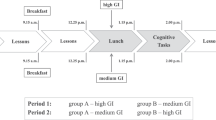Abstract
Rationale.
Glucose is the main metabolic fuel of the brain. The rate of glucose delivery from food to the bloodstream depends on the nature of carbohydrates in the diet, which can be summarized as the glycaemic index (GI).
Objectives.
To assess the benefit of a low versus high GI breakfast on cognitive performances within the following 4 h.
Methods.
The influence of the GI of the breakfast on verbal memory of young adults was measured throughout the morning in parallel to the assessment of blood glucose levels. The learning abilities of rats performing an operant-conditioning test 3 h after a breakfast-like meal of various GI was also examined.
Results.
A low GI rather than high GI diet improved memory in humans, especially in the late morning (150 and 210 min after breakfast). Similarly, rats displayed better learning performance 180 min after they were fed with a low rather than high GI diet.
Conclusion.
Although performances appeared to be only remotely related to blood glucose, our data provide evidence that a low GI breakfast allows better cognitive performances later in the morning.


Similar content being viewed by others
References
Benthem L, Bolhuis JW, van der LJ, Steffens AB, Zock JP, Zijlstra WG (1994) Methods for measurement of energy expenditure and substrate concentrations in swimming rats. Physiol Behav 56:151–159
Benton D, Owens DS (1993) Blood glucose and human memory. Psychopharmacology 113:83–88
Benton D, Parker PY (1998) Breakfast, blood glucose, and cognition. Am J Clin Nutr 67:772S–778S
Benton D, Sargent J (1992) Breakfast, blood glucose and memory. Biol Psychol 33:207–210
Donohoe RT, Benton D (1999) Cognitive functioning is susceptible to the level of blood glucose. Psychopharmacology 145:378–385
Englyst KN, Englyst HN, Hudson GJ, Cole TJ, Cummings JH (1999) Rapidly available glucose in foods: an in vitro measurement that reflects the glycemic response. Am J Clin Nutr 69:448–454
Englyst KN, Hudson GJ, Englyst HN (2000) Encyclopaedia of analytical chemistry. Wiley, New York, pp 4246–4262
Englyst KN, Vinoy S, Englyst HN, Lang V (2002) Rapidly and slowly available glucose: physicochemical measures that describe the glycaemic index of cereal products. Br J Nutr (in press)
Flood JF, Morley JE (1989) Cholecystokinin receptors mediate enhanced memory retention produced by feeding and gastrointestinal peptides. Peptides 10:809–813
Flood JF, Morley JE (1992) Differential effects of amylin on memory processing using peripheral and central routes of administration. Peptides 13:577–580
Foster-Powell K, Hoft SHA, Brand-Miller JC (2002) International tables of glycemic index and glycemic load values: 2002. Am J Clin Nutr 76:5–56
Foster-Powell K, Miller JB (1995) International tables of glycemic index. Am J Clin Nutr 62:871S–890S
Gispen WH, Biessels G-J (2000) Cognition and synaptic plasticity in diabetes mellitus. Trends Neurosci 23:542–549
Geisler MW, Polich J (1992) P300, food consumption, and memory performance. Psychophysiology 29:76–85
Gold PE (1991) An integrated memory regulation system: from blood to brain. In: Frederickson RCA, McGaugh JL, Felton DL (eds) Peripheral signaling of the brain. Hogrefe and Huber, New York, pp 391–419
Jenkins DJ, Wolever TM, Taylor RH, Barker H, Fielden H, Baldwin JM, Bowling AC, Newman HC, Jenkins AL, Goff DV (1981) Glycemic index of foods: a physiological basis for carbohydrates exchange. Am J Clin Nutr 34:362–366
Kaplan RJ, Greenwood CE, Winocur G, Wolever TM (2001) Dietary protein, carbohydrate, and fat enhance memory performance in the healthy elderly. Am J Clin Nutr 74:687–693
Kaplan RJ, Greenwood CE, Winocur G, Wolever TM (2002) Cognitive performance is associated with glucose regulation in healthy elderly persons and can be enhanced with glucose and carbohydrates. Am J Clin Nutr 72:825–836
Ludwig DS (2002) The glycemic index physiological mechanisms relating to obesity, diabetes, and cardiovascular disease. JAMA 287:2414–2423
Messaoudi M, Tricoire A, Lalonde R, Canini F, Minn A (1996) Effects of MPTP on lever-pressing for light extinction in rats. Eur J Pharmacol 299:17–20
Messier C, Destrade C (1988) Improvement of memory for an operant response by post-training glucose in mice. Behav Brain Res 31:185–191
Morley JE, Flood J, Silver AJ (1992) Effects of peripheral hormones on memory and ingestive behaviors. Psychoneuroendocrinology 17:391–399
Park CR (2001) Cognitive effects of insulin in the central nervous system. Neurosci Biobehav Rev 25:311–323
Park CR, Seeley RJ, Craft S, Woods SC (2000) Intracerebroventricular insulin enhances memory in a passive-avoidance task. Physiol Behav 68:509–514
Smith A, Kendrick A, Maben A, Salmon J (1994) Effects of breakfast and caffeine on cognitive performance, mood and cardiovascular functioning. Appetite 22:39–55
Author information
Authors and Affiliations
Corresponding author
Rights and permissions
About this article
Cite this article
Benton, D., Ruffin, MP., Lassel, T. et al. The delivery rate of dietary carbohydrates affects cognitive performance in both rats and humans. Psychopharmacology 166, 86–90 (2003). https://doi.org/10.1007/s00213-002-1334-5
Received:
Accepted:
Published:
Issue Date:
DOI: https://doi.org/10.1007/s00213-002-1334-5




